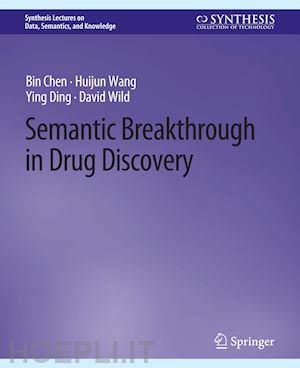Bin Chen is currently a postdoctoral scholar at Stanford University. His primary interest is to develop tools and algorithms to identify new therapeutics from publicly available data sources. He received his Ph.D. in informatics at Indiana University, Bloomington. During his gradu ate school, he primarily developed three systems (i.e., Chem2Bio2RDF, Chem2Bio2OWL and SLAP) used to represent, integrate and mine semantic data for drug discovery. He interned in three pharmaceutical companies (i.e., Novartis, Pfizer and Merck) for two years during this grad uate school. He has published over 20 scientific papers Huijun Wang is an Associate Principle Scientist in the Cheminformatics Department at Merck. She leads the competitive intelligence data integration and information retrieval project and also focuses on text mining and data mining of chemical and biological information related to drug discovery. She has worked in the pharmaceutical industry for many years, including four years at Pfizer before joining Merck. She managed the large-scale internal and external data integration, retrieval and mining effects. She graduated from Indiana University with a Ph.D. in Informatics and an M.S. in Computer Science and Cheminformatics Dr. Ying Ding is an Associate Professor at School of Informatics and Computing, Indiana Uni versity. Previously, she worked as a senior researcher at the University of Innsbruck, Austria and as a researcher at the Free University of Amsterdam, the Netherlands and has been involved in various NIH and European-Union funded Semantic Web projects and has published 170+ papers in journals, conferences, and workshops. She is the co-editor of book series Semantic Web Synthesis by Morgan & Claypool Publisher. She is co-author of the book Intelligent Information Integra tion in B2B Electronic Commerce, published by Kluwer Academic Publishers, and co-author of book chapters in the book Spinning the Semantic Web, published by MIT Press, and Towards the Semantic Web: Ontology-driven Knowledge Management, published by Wiley. Dr. Ding is on the editorial board of four ISI indexed top journals in Information Science and Semantic Web. Her current research interest areas include social network analysis, Semantic Web, citation analysis, knowledge management, and application of Web Technology. David Wild is an Associate Professor at Indiana University’s School of Informatics and Com puting (SOIC) where he is a Graduate Program Director for the new Data Science Program and leads the Cheminformatics and Chemogenomics Research Group (CCRG). He is the founder and Chief Executive Officer at the data science technology company Data2Discovery Inc. and consults through Wild Consulting and Innovations. He has around 100 research publications, edits the Journal of Cheminformatics, and maintains a variety of educational resources including LearnCheminformatics.com, SurvivingDisasters.net and the All Hazards Blog. He is an Emergency Medical Technician (EMT) and volunteer with Bloomington Township Fire Depart ment and Argus Canine Search and Rescue











